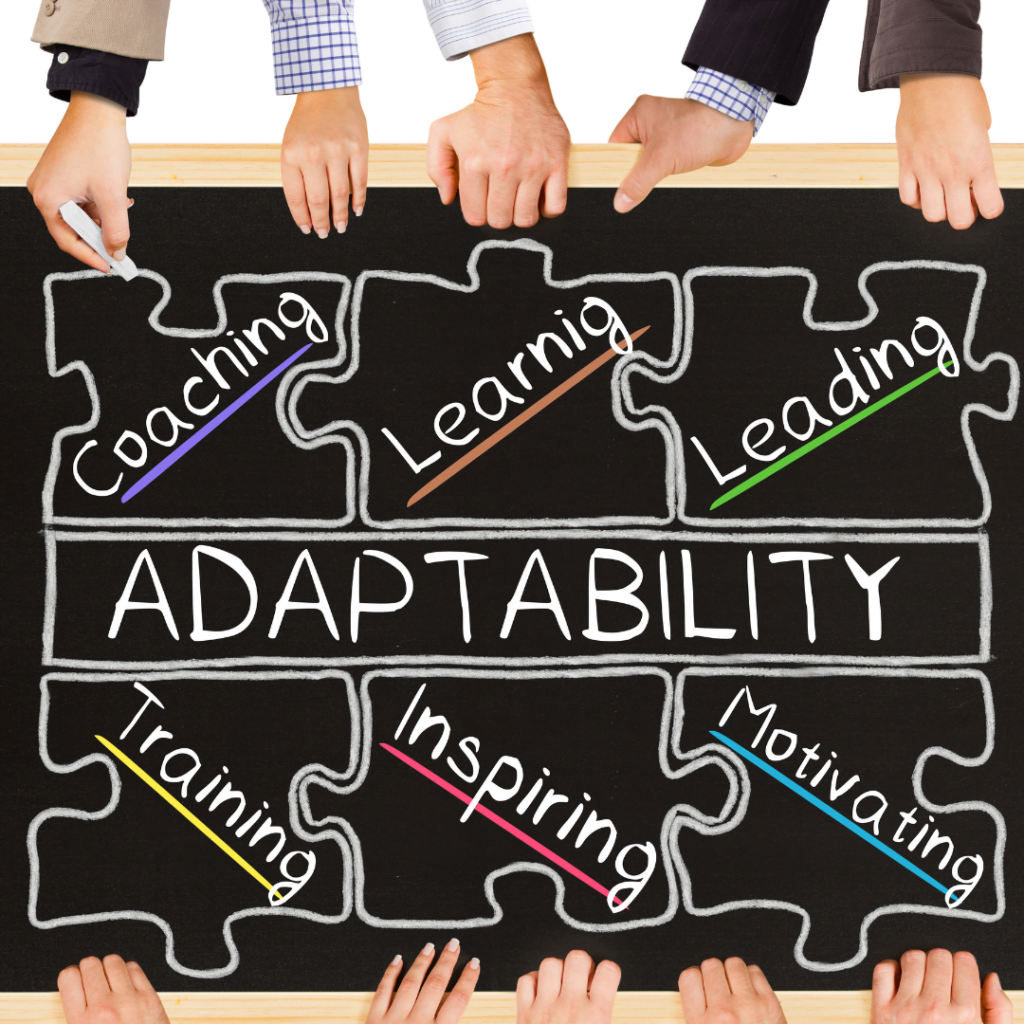Providing employees with relevant and consistent soft skill training can help improve workplace performance and efficiency.
Adaptability in Workplace.
Adaptability is the ability to learn new things; it is the art of being the flexible and accepting change. It is the potential to adjust to changing factors, conditions, and environments. It is a widely acceptable soft skill by all employers because the languishing challenge in business and industry is changing environment and emerging new technology.
Adaptability in the workplace is the ability to spindle by learning new skills and behaviour per the command of changing environment. The ability to adopt is slightly different and very much depends upon the workplace, environment, and individual’s specific role.

The ability to adapt is different from the ability to manage change; managing change is preparing the workforce. Engage shareholders, transition change, manage risk, and improve performance. Adaptability is a soft skill which is much more in demand. It is a skill which shows how employees reacts in unplanned and involves rapid adjustment concerning changing situations.
Adaptable employees will be able to shift strategy quickly and effectively, finding alternative solutions that have not been anticipated in advance. Employees should be innovative, quick learners with the attitude to accept and adopt the change.
A fable from childhood called “The Oak and The Willow” tells the story of two trees as the weather changes. As the tale goes, a tan oak tree and a willow tree stood in the same field. A windstorm broke the oak tree one day while the willow stood firm. When the wind blew, the willow would blow every way while the oak tree stood tall. This caused great distress to the willow, who lamented his inability to stay as strong as the oak. The willow tree’s adaptive nature allowed it to bend with the winds of change, while the rigid oak suffered a cruel fate.
Though just a story, this fable illustrates a principle that’s also important in business i.e. the ability be adaptive.
Employer Role Towards Adaptation
The employer also plays a vital role in supporting the workforce to adapt to the change. They can create a learning environment by providing soft skill training. Employers should be involved in creating a new ecosystem with the required infrastructure, introducing the courses for up-skilling employees, and measuring and mentioning feedback regularly as per the requirement.
Skills Required For Adaptation
Adaptation for change is quite challenging. It is mainly required to maintain a competitive edge in the business world, and employees should inbound the following skills to respond effectively to changes:
Accepting the changes and adopting the changes
Effective problem solving
Exchanging of thoughts and knowledge
Acquiring required new skills.
Work together as a team.
Setting the goal and staying motivated.
Work under pressure
Fit to the culture
Importance of Adaptability
Adaptability is essential for constant business changes. Nothing is a good change. It is only the truth that should be acceptable for survival. Adaptability showcases the ability to be resourceful, displays leadership skills, and determination skills, and these are valuable adaptable qualities an employer looks for in an employee; both employee and the employer will be more relevant to ongoing changes in technology, current environment, and other fields.
 Adaptive Readiness.
Adaptive Readiness.
The first and foremost step for adaptation is to make up your mind to accept the changes and sharpen the skills in the critical area, “Corporate Training plays a crucial role in developing adaptability skill.”
The following factors can be considered at the time of delivering or designing corporate training on adaptability:
Make up your mind to come out of your comfort zone.
Developing listening ability.
Thinking out of the box.
Adoption of positive thinking
Open up to learn from coworkers.
Be a good team player.
Practice emotional intelligence.
Fixing up the goal.
Benefits of Adaptability Training:
Adaptability training to a workplace is beneficial for both employees and employers.
Employees develops adaptable nature and become more valuable employees and adds value to the organization.
Employees with a learning attitude for adopting themselves in the workplace also develops leadership skills and lead the organization on the right path.
Employees becomes better equipped to face challenges and will enjoy career growth.
Adapatability corporate training makes the ready workforce for employers.
Conclusion:
It is crucial to provide corporate training on adaptability. The important role of soft skill training towards adaptability. Providing employees with relevant and consistent soft skill training can help improve workplace performance and efficiency. It creates an opportunity for employees to enhance their knowledge impacting productivity, moral values, and commitment towards the work despite the cost of corporate training for employers. The return on investment on corporate training session on soft skill is enormous if it is constant.





Leave a Reply